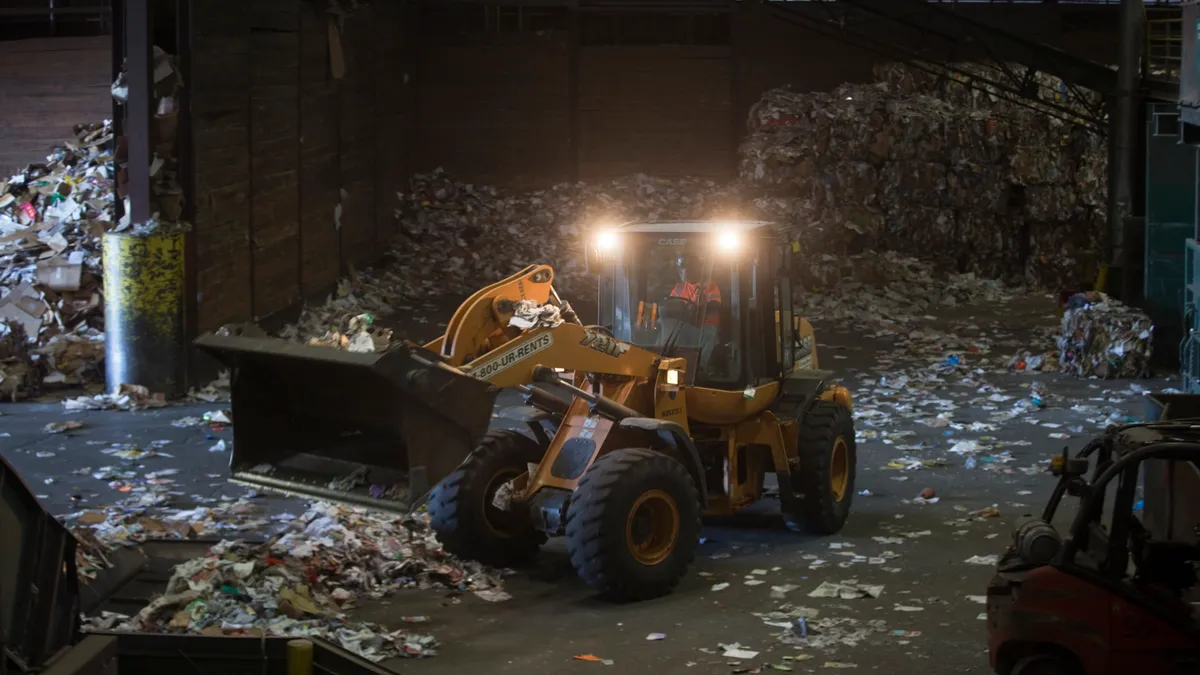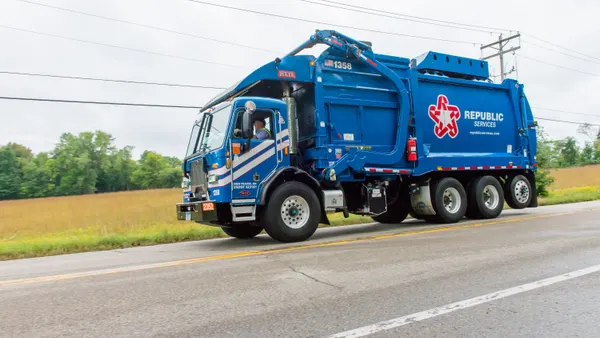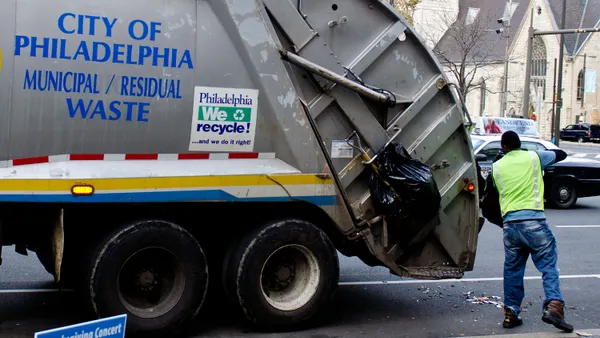UPDATE: Aug. 9, 2021: Gov. Kate Brown signed SB 582 into law on Friday, making Oregon the second state to pass an extended producer responsibility (EPR) law for packaging. Maine's governor signed the first EPR law in July.
Under the law, most producers will need to become a member of a producer responsibility organization (PRO). The PRO will need to submit an EPR plan to Oregon’s Department of Environmental Quality (DEQ) by March 31, 2024, and begin implementing the plan by July 1, 2025. Local governments will be able to use producer funding for improvements such as recycling facility upgrades, increased collection services, certain transportation needs and contamination reduction programs, according to the bill.
Dive Brief:
- June 30: An Oregon bill (SB 582) that establishes extended producer responsibility for packaging and calls for other major updates to the state’s recycling system is headed to Gov. Kate Brown’s desk. If signed, the bill goes into effect on Jan. 1, 2022 and a producer responsibility organization would need to start implementing an approved plan by July 1, 2025.
- In addition to creating an EPR program, the bill would establish new operating and performance requirements for MRFs and call for creating a “statewide collection list” meant to standardize the types of material accepted. Additionally, the bill includes details around organics processing, recycling collection access, litter cleanup and more.
- It also repeals a requirement for certain plastics to include the chasing arrow symbol and establishes a “Truth in Labeling” task force meant to “study and evaluate misleading or confusing claims” about whether certain products are recyclable. The task force must complete a report of its findings for the state legislature by June 1, 2022.
Dive Insight:
Oregon was one of the first states to feel the brunt of National Sword’s market effects, leading to a period of disposal waivers for recyclables and curbside program disruptions. That experience may now put Oregon at the forefront of a national recycling policy debate yet again, just as it passed the first bottle bill in the late 1970s.
Following the effects of China’s scrap import policies, Oregon’s DEQ began hosting regular Recycling Steering Committee meetings to discuss solutions with industry operators and local governments. After more than two years of discussion, the group coalesced around a set of recommendations last fall that informed this DEQ-backed legislation.
The potential establishment of a producer responsibility system – which proponents hope can eventually lead to outcomes such as a 70% recycling rate for plastic packaging and food ware by 2050 – is already notable. Multiple states have debated EPR for packaging, but Maine is the only other one on track to potentially launch a program. The labeling discussion could also have broader implications.
While initial labeling requirements came out during the amendment process, a 15-member task force will assess how to avoid consumer confusion on packaging and create a system that Oregon could adopt through future legislation. Members will include representatives from local governments, the state legislature, packaging producers, the recycling industry and environmental groups. Opponents have said proposals like this and California’s pending SB 343 could essentially create a national standard, but the state doesn't necessarily agree.
“DEQ’s position is that we see it as possible to basically be able to help the public in Oregon understand the issue of how items are labeled without creating conflicts elsewhere,” said Sanne Stienstra, a natural resource specialist with the agency.
The bill received testimony from dozens of stakeholders in recent months. Groups such as the Oregon Refuse & Recycling Association (ORRA) and the Association of Oregon Recyclers were supportive. A coalition of local government organizations from Oregon cities and counties wrote in a support letter that the bill would make the recycling system in the state more equitable and reduce contamination. “Producers have the greatest ability to implement changes that can make their products easier to manage,” the group said.
ORRA Executive Director Kristan Mitchell said that was a priority for recyclers as well.
“We believe it’s one of the major reasons that customers are so confused,” Mitchell said, connecting it to contamination levels. She expressed hope that producers could hash the issue out constructively in the task force, given their initial role in pushing requirements to include chasing arrow symbols on packages in dozens of states. “I have very limited sympathy for the argument that it is complicated and difficult because one state could be different than others.”
Mitchell and others said the bill comes after a detailed review of packaging EPR systems in other countries, which led to the proposal where current players continue to operate their infrastructure rather than turning it over to producer control. Those discussions, and program guidance, will continue under a newly created Oregon Recycling System Advisory Council. Establishment of the EPR system is intended to help support updates to the existing infrastructure.
“The producers will basically offset the cost of MRF compliance with the new standards that are set up in the legislation, and that includes the living wage,” said Stienstra, adding the wage component will dovetail with a related standard being developed by the Portland area regional government entity Metro.
Like the Maine EPR bill, the final details of Oregon’s system will need to be determined in the coming months and years. Strong engagement from various packaging-related trade groups can be expected.
The Flexible Packaging Association and American Packaging opposed the bill because it gives “far too much power to the DEQ and municipal governments to demand reimbursement for costs without giving the EPR program the appropriate authority to negotiate its needs in accomplishing its plan.” FPA also was concerned the money collected would go to bolster the current recycling infrastructure in the state but not “advanced infrastructure” for harder-to-recycle items such as flexible packaging.
The American Forest and Paper Association, AMERIPEN and the Consumer Brands Association opposed Maine’s bill and signed onto a letter this month opposing Oregon’s bill. The letter, representing nearly 40 business, food and manufacturing groups, said the bill covers products that are already being recycled, and the proposal would increase recycling costs by 30% while raising the recycling rate by only 3%. DEQ refutes that, estimating that recycling of covered products will increase by 17%.
This week, a CBA spokesperson reiterated the group opposed Oregon’s bill because it did not meet a set of principles, including being a producer-run system, and could potentially lead to cost increases for consumers.
At this week’s WasteExpo, AMERIPEN Executive Director Dan Felton said that while his group didn’t support the bill it appreciated the multi-year stakeholder process. Others at the event that have been resistant to EPR in the past also said this is key.
“It felt for a long time like the haulers weren't going to come around on EPR, now I think everybody's starting to get on board, the producers too, and we're all starting to get closer and closer to what we can agree to,” said Susan Robinson, senior director of policy and sustainability at Waste Management. “I think stakeholder processes are absolutely critical. If you don't have everybody at the table having honest discussions, things are going to blow up."












